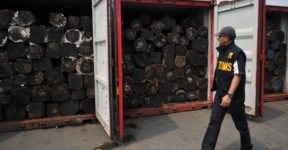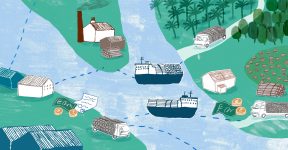
Buying Better in the Asia-Pacific: the Role of Public Procurement in Sustainable Supply Chains
Progress towards tackling illegal logging in Asia continues to be made but public procurement for legal and sustainable timber remains an underutilized policy tool, write Adelaide Glover and Thiago Uehara.
China, India, Japan, South Korea, Thailand and Vietnam have each taken significant steps in their efforts to tackle illegal logging and the related trade over the last decade. Similar to other parts of the world, there has been growing awareness of the scale of illegal logging and its economic and environmental impact. This has been translated into greater cooperation by national governments at the international level including in multilateral fora such as EGILAT as well as bilaterally with the EU along with other countries in the region. In addition, trade controls for illegal timber have been developed, or are under consideration, in a number of these countries too.
Public procurement is another policy area where there has been growing interest although it remains underutilized in these countries to date. Yet, it can be an influential tool to shift markets and promote legal and sustainable supply chains and has been used to this effect in several countries analysed in Chatham House’s assessments including France, the Netherlands and the United Kingdom. The potential of public procurement in developing economies is even greater, however, because of the large market share of government purchasing – public procurement is the largest single marketplace in these economies, and on average, accounts for 14.5 per cent of their gross domestic product (GDP).
The six countries in question are all large consumers of paper and timber products. But how have they dealt with sustainability and legality in their procurement practices for these products?
China has had a green public procurement policy in place since 2006. The policy covers a number of timber and paper products and requires all levels of state bodies, institutions and organizations to give priority to purchasing ‘Environmental Labelled’ products. However, its scope is limited and monitoring of its implementation needs improvement. Currently, legality and sustainability criteria are not uniform across the different products included in the policy and although the Ministry of Finance is responsible for monitoring compliance, it does not have the capacity to verify the legality or sustainability of the wood being purchased.
Thailand has a voluntary green public procurement policy in place that covers only a handful of timber and paper products. The policy applies to regional and local government offices but implementation is hindered by a lack of information and promotion as well as limited capacity of procurement officers at the sub-national level.
Vietnam is the only country that does not yet have a procurement policy in place for timber but political momentum for such a policy has increased since 2018. In 2020, Vietnam’s prime minister directed the Ministry of Agriculture and Rural Development to work on legality indicators to be adopted for all timber products purchased through a public procurement process.
In Japan, the ‘Basic Policy on Promoting Green Purchasing’ was revised in 2016 to refer to the new Clean Wood Act which is designed to promote the use and distribution of legally harvested wood and wood products in Japan. The policy refers to the Act and its guidelines as a standard of wood and wood products. The policy is mandatory for ministries and agencies, independent administrative institutions, special legal entities and other national institutions, however, there is no penalty for non-compliance.
In South Korea, a procurement policy for ‘eco-friendly’ paper, packaging products and wood composite products applies to all government agencies and public institutions that use government funds but the policy does not require products to be certified under internationally recognized certification schemes.
India also does not have a procurement policy that explicitly excludes illegal and unsustainable timber from government purchasing but environmental aspects are considered when assessing the value for money of goods. The establishment of a Task Force on Sustainable Public Procurement in 2017 is, however, a positive step with paper being one of the first products that it has started work on.
The picture outlined above shows that there is a lot of room for improvement in the use of public procurement as a policy tool. Public procurement systems need to ensure not only value for money but also that the public budget is not used to purchase illegal or unsustainable products. Such systems are likely to be more effective when made more rigorous, through mandatory regulations rather than voluntary instruments, and enforceable with penalties for non-compliance.
A broad product scope and clear criteria for establishing legality and sustainability are also required. Alongside improved regulation, training is needed for procurement officers and the business sector, in particular, for small and medium enterprises including rural cooperatives while transparent monitoring and reporting mechanisms should also be put in place.
Public procurement should not be viewed as a bureaucratic activity. Rather, it is a fundamental part of the relationship between governments, society and the environment. There is a need for a broader look at how public procurement can best support national priorities for tackling climate change and promoting sustainable economic development. Chatham House has been analysing the use of public procurement in tropical forest countries and the research, to be published in a forthcoming paper, shows that it can be an important part of achieving national objectives for sustainable development.


